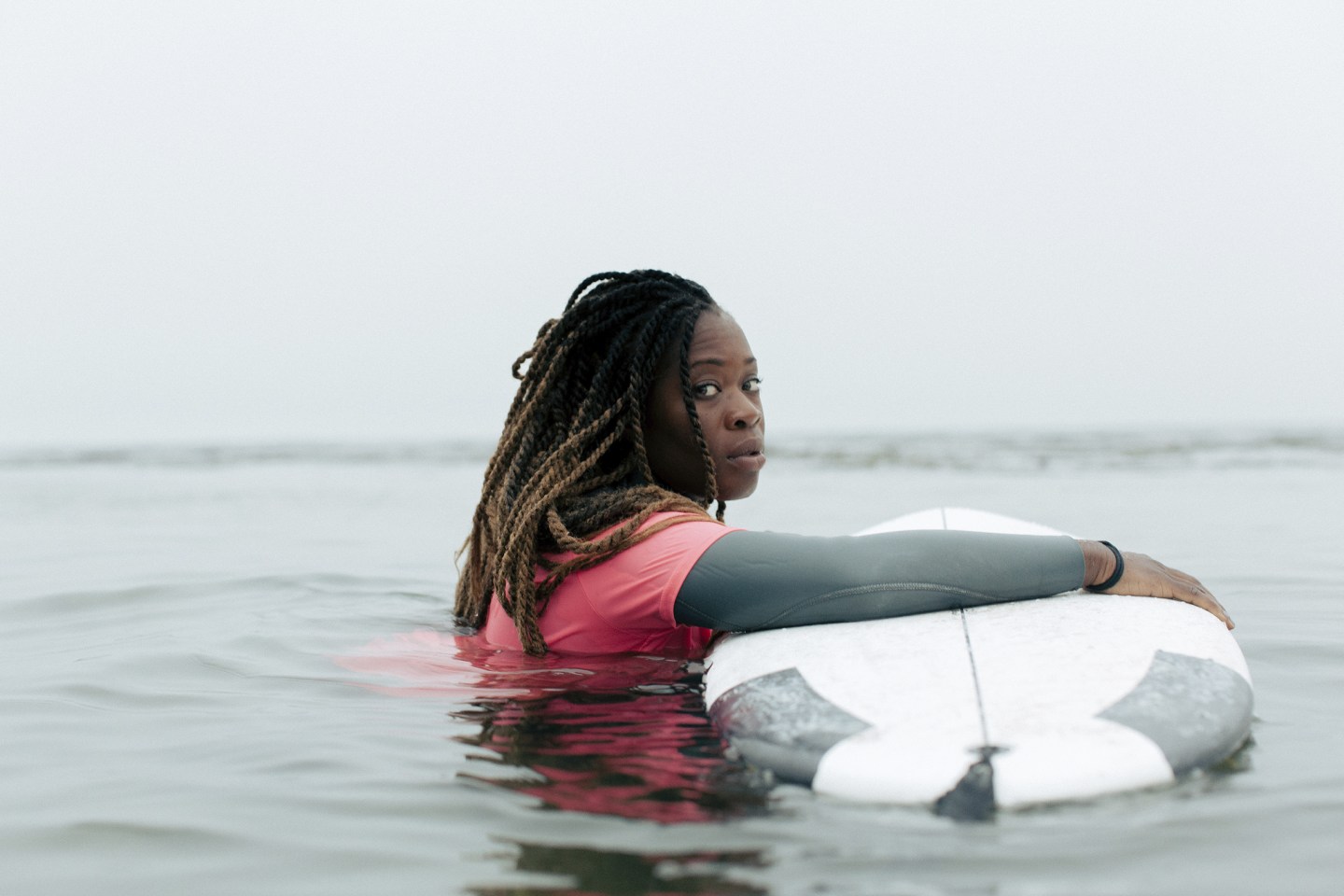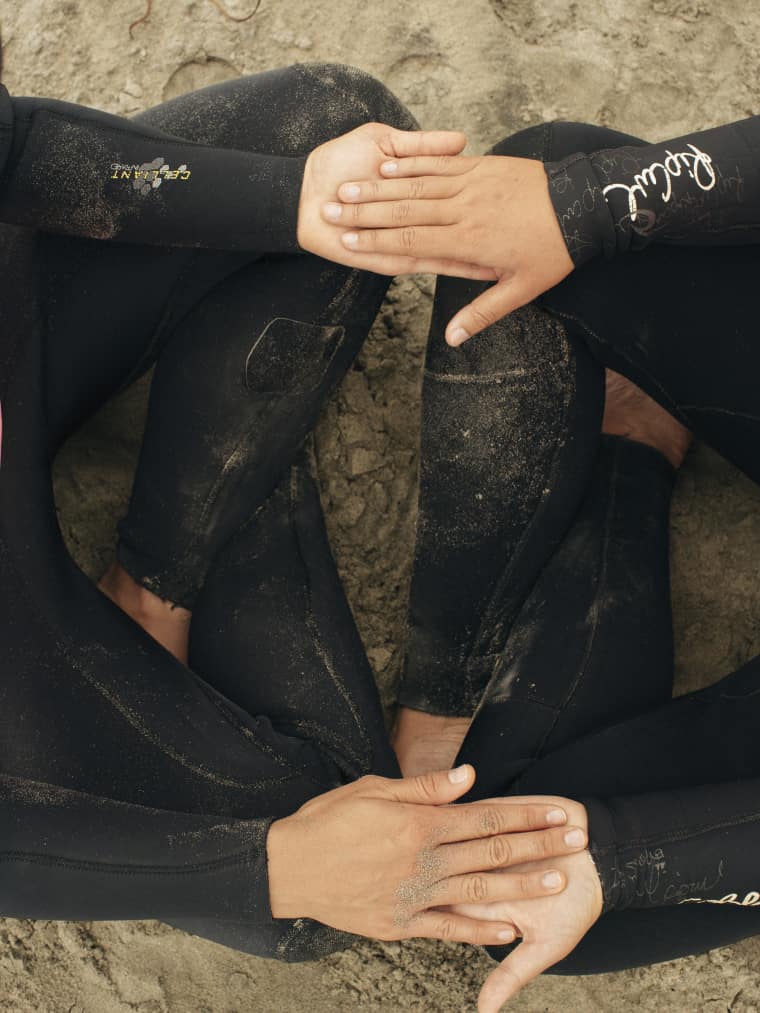The California nonprofit teaching brown women how to find freedom in the water
In the ocean with Brown Girl Surf.
 Natasha Brown, Brown Girl Surf teaching volunteer
Natasha Brown, Brown Girl Surf teaching volunteer
Early on a foggy August morning, a three-car caravan made its way from Berkeley, California, to Half Moon Bay, a coastal town 30 miles south of San Francisco. One car, a tiny Nissan Versa, belonging to Natasha Brown, was loaded with four surfboards. The other two cars held Shina Robinson, Ginger Cuevas, and me; we were headed to join a handful of other women at Miramar Beach for a surf session. The meet-up was organized by Brown Girl Surf, a volunteer-driven, nonprofit organization based in Oakland and co-founded by Farhana Huq and Mira Manickam in 2011. Its original mission was to amplify the visibility of brown women who surf, but in what Manickam describes as a “river story” with many small streams joining in, the program eventually grew to teach brown women and girls how to surf and be active environmental stewards.
Ginger’s first time surfing was with BGS in February. Since then, she’s gone out to catch waves about 30 times. “Going for it at 34 was scary as hell in the beginning but so, so rewarding at the same time,” she said.“My daughter comes with me to the beach; she’s 9. She’s fearless, though. It’s different when you’re a kid. You’re closer to the ground, you fall different.”
In order to surf, you must learn how to focus on the ocean — its movement, its pace, its temper. And for a couple of hours, your mind is rid of any thoughts and your body of any function but to catch a wave. The nine women who gathered at the ocean that morning had made time away from their children, their responsibilities, and their jobs. Before taking on the waves, they meditated together. The ocean, they all said, offers vital things that their worlds on land don’t: an outlet that challenged and rewarded them physically and mentally without a bias for the color of their skin.
Natasha, a teaching volunteer with BGS, started surfing regularly when she was 27. She told me about how her love of water grew into an obsession with surfing and how she came to paddle freely to the middle of a culture that doesn’t look like her.



Natasha Brown: When I was 3 or 4, my mom sent me to a local summer camp. I really liked the water and I kept jumping in. And I didn’t know how to swim. One day I jumped in and it was too deep and [I] had to grab at someone to save me, so my mom vowed from then on that I needed to go to swimming classes. Being in the middle of Manhattan, we didn’t have that much access to water, so to be able to go to the pool near our house every Saturday was like the highlight of my childhood.
I had been obsessed with surfing since I was young. And it was really weird since I’m black and I lived in New York. My mom was like, “This is really bizarre.” Maybe I saw it on TV or maybe I saw an ad or something? But it’s all I talked about. It’s all I ever wanted to do but we couldn’t. It wasn’t until my mom decided that enough was enough and she took me to Hawaii. It was a surprise graduation present.
She set me up with a surfboard rental and an instructor. The first time I got on the board I was 16 and that just fueled it. I looked at colleges in California so that I could surf, but in the end, I ended up getting the best scholarship in New York. So it was a couple years before I could surf consistently. When I moved to New Orleans, I would travel for hours to surf. There were really crappy waves but they were surfable. And so I’d go for hours every two to three weeks.
I had this picture in my head that when I surfed it was going to be so easy, so graceful. And then when it actually happened, I wiped out. The board felt so foreign to me. I remember thinking, Wow is this really surfing? That awkward feeling lasted for a while — even when I was surfing every day. Experiencing my first wipeout and realizing that it’s not so bad made it easier to endure the next six months of wipeouts. It was fun because I was working toward something.


“I’m way more fearful of being a female of color on land in America than I am out there in the middle of the shark triangle.” —Natasha Brown

When I am in the water, that whole environment that’s around me, even if it’s aggro surfers in the water, is non-existent. The only thing that controls how I feel is how I feel. It makes me feel a lot more in control of myself. It makes me feel a lot stronger. I’ve always known that I am really strong but the water allows me to really use that. It’s an outlet. Being in the water, touching the water, makes me feel like I’m at home. Even if I’m going through a breakup or having a really emotional, traumatic experience on land, once I connect with the water, it’s like running into a mother’s arms. It’s soothing, it’s calming, it’s familiar. Even sitting there and waiting for a wave on a flat day is healing for me.
It was definitely a shock when I came to California and realized that surfing was a white man’s paradise. I stuck out like a sore thumb. For the first two months, it actually was the first time in years that I surfed maybe once a week, at most, twice a week. I had this new wave of fear that came over me. I knew no one in the water and [either] no one looked at me or people were staring at me.
Eventually I felt really empowered to have my space in the water. I found that I went from being really scared to get into the water with these aggro guys to paddling out and sitting right in the middle of these white men. Because I didn’t want to sit on the side and be like, This is their space, I’m just a visitor. I wanted to say, This is my space also. So it was really special for me to see my own transformation. A lot of times women stay at the side — we don’t want to get in anyone’s way, we don’t want them to yell at us — and I push myself to never do that.
I have learned that just because you have a connection to the ocean, it doesn’t mean that the ocean is always going to be nice to you. I’ve learned that the ocean is always going to be honest to you. What that means is if you need to be knocked on your ass, you’re going to get knocked on your ass. With people, if you’re not feeling okay, they’ll adjust themselves to you. The ocean is like, “Fuck no!” It makes you step up. It makes sure that you don’t make an excuse. You have to be at 100%, [otherwise] it’s going to kick your ass. It’s like having the most perfect best friend that’s not going to sugarcoat shit for you. I love it.
I’ve learned that I have a strength that surpasses any of my expectations. And that is not just physically, it’s emotionally, it’s spiritually. That strength that was in here the whole time, [the ocean] has pulled it out of me. And I’m so grateful for that — to have a place where I’m totally, 100% at peace, is a gift that I could never buy.


“Once I connect with the water, it’s like running into a mother’s arms. It’s soothing, it’s calming, it’s familiar.” —Natasha Brown
I started volunteering with Brown Girl Surf about six months ago. I feel like the organization represents me. It represents everything that I stand for. It wants to create a space for me and for that I’m so grateful. From my first day here, I felt this was my place. I was supposed to be here. This organization was made for all of us, but this organization was made for me.
One of my first Brown Girl Surf events, I got paired with this little black girl and she reminded me of myself. She was kind of like, “I don’t know. I kinda want to surf. Whatever.” And she got in the water, and this girl! The first wave she caught, [she] popped up! And all of a sudden it clicked: “I want to do it again! I want to do it again!” This girl had me running for two hours straight back and forth and it was the most magical two hours I’ve ever had. That one wave that she got changed everything. And she wanted to improve on her paddling and she wanted to try it alone and she wanted to go up a little more. All her fear, if she had fear, just went away.
Once, I went into the water with a friend [in Costa Rica] and my leash broke. I got swept out by a current. No one could find me for 15 minutes. They called the police because they thought I was dead. As I was getting swept out, I was paddling but I never panicked because I knew I wasn’t going to die. Because I knew that the water wasn’t going to do that to me. Even though it sounds traumatizing, it was magical because I had never felt that sense of security. That sense of comfort.
I would surf around a family of sharks and feel more comfortable than I do with our current government. I’m way more fearful of being a female of color on land in America than I am out there in the middle of the shark triangle where they’re nesting and giving birth. Last week I saw a shark and I still felt a lot safer than when I went home and, looking on my phone, realized that, Oh, our president is supporting white supremacists.
Being on land and knowing that I’m being judged for something that is so arbitrary as the color of my skin is very uncomfortable for me. It makes me feel like no matter how strong I am, no matter how smart I am, no matter what I do, the end result is still the same. Whereas in the water, it’s not that way. It’s different.


